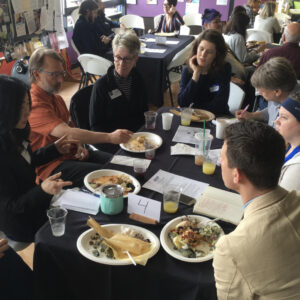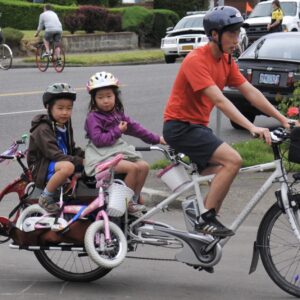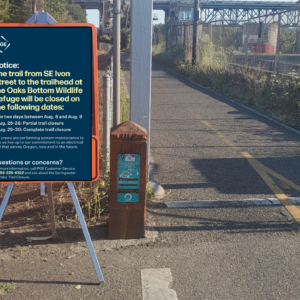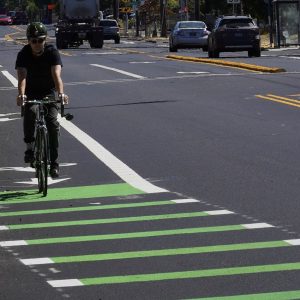What if you and your fellow Portlanders had a direct impact on what city funds were spent on? I’m not talking about lobbying politicians and then hoping they do what you want; I’m talking about true direct democracy where you come up with a project idea, work with your peers to flesh it out, get support for it from a vote of the people, then get it funded and implemented.
That’s the promise of participatory budgeting (PB), and a local effort to have it become an official part of the city of Portland’s budget process launched on Thursday.
The Community Budgeting for All campaign is gathering signatures to get PB on the ballot in November. The effort is being led by nonprofits Next Up, East County Rising, and Participatory Budgeting Oregon and their campaign wants to put at least 2% of the city’s General Fund budget — an estimated $15.6 million — into the hands of the people. Yesterday I interviewed one of PB Oregon’s staffers, Maria Sipin, to learn more about the initiative and how PB is different than the way we currently do things. (Watch our conversation below.)
As a former transportation planner with the Oregon Department of Transportation, Sipin saw first-hand that what gets funded often doesn’t reflect what people on the ground actually want and need. “What I personally like about it is in a PB process, you don’t end up with highway projects… people put forward projects in this process that have never been funded in the past, but should have. It addresses community safety, basic needs and all kinds of things that might have been overlooked.”
Don’t people already influence budgets by voting for elected officials and taking part in the budget process?
“Electing people is a form of democracy, but it’s not direct democracy. We can ask our elected officials to take action, but it doesn’t really require them to do something within a given amount of time,” Sipin answered. “It’s the legally binding aspect of PB that really can demonstrate people’s power and government’s ability to implement something that the people want.”
Asked for a specific example of a project like that, Sipin described school streets.
“[A type of project] that comes up a whole lot in spaces I’m in is keeping cars from approaching the school at a close distance and being able to save local streets for walking and biking safely and not dealing with the commotion of drop-offs and pick-ups of SUVs confronting their children at forehead height,” Sipin said. “If there was an appetite to create that type of street environment and PBOT said it could be feasible, you would work with PBOT, community orgs, parents, schools — to design a proposal.”
One thing I learned from talking with Sipin is that a big element of PB is community empowerment — not just in the form of controlling funds, but giving people the knowledge and experience about what things cost and how to develop high-quality funding proposals. I’ve found through doing BikePortland all these years that once you inform and empower people, amazing things can happen. And it’s a two-way street: regular folks like you and I would be engaged at a deeper level and city staff would learn what we want in an unfiltered way. But unlike a typical budget process where city staff and elected officials hold all the power, in PB, the scale of power tilts toward the people.
Below is a description of the process taken from the campaign website at CommunityBudgetingforAll.com, followed by the initiative language filed with the city auditor’s office:
Instead of typical backroom deals and ignored public testimony, residents would collaborate in the community and with City staff to develop and fund solutions. Portlanders would have a recurring avenue to bring forward problems, build skills, and relationships, and craft shared goals and solutions in partnership with City staff.
If it sounds like there’d be too many cooks in the kitchen, Sipin said a key part of a good PB process is one where the structure of decision-making is clearly laid out at the start. Professional facilitators are brought in to make sure things run smoothly, and a committee of delegates and city staff vet projects to make sure they’re feasible.
Another interesting wrinkle is that all Portlanders would be eligible to vote on projects — not just eligible voters. That means about 200,000 Portlanders — who aren’t currently on voting rolls — could have a say in how funds are spent.
Sipin says once people learn and participate in the process, PB becomes a tool that builds real community power. “PB is meant to be consistent and not a one time thing. Being able to witness this and be part of it, it’s really powerful,” she said. “And this is why some cities, once they put PB into place, it just becomes part of their democracy from here on out.”
Portland would become one of the last major west coast cities to institute a PB process, as the idea has caught on in many other cities around the U.S. and the globe (a portion of the European Union budget is allocated using PB principles). If this campaign can gather about 41,000 signatures by July and if voters support the ballot measure in November, the program would begin in the 2026-2027 fiscal year and the process would begin no later than July 2027.
— Learn more at CommunityBudgetingForAll.com.
View a short highlight reel of my conversation with Sipin below:










Thanks for reading.
BikePortland has served this community with independent community journalism since 2005. We rely on subscriptions from readers like you to survive. Your financial support is vital in keeping this valuable resource alive and well.
Please subscribe today to strengthen and expand our work.
A true direct democracy is a horrible thing. We don’t want a majority of people deciding what the minority will be doing. I true democracy would have all the drivers voting out every other mode of transport. So explain how this participatory budgeting is not an oppressive democracy.
Is it because there’s such a small amount at stake? And the city isn’t obligated to do any of it? If so, then how is it a direct democracy? Sounds a lot like current processes of asking the city for something and hoping they do it.
Is this just a new way to gather votes for a project? The marketing sounds off for that approach.
Who told you a direct democracy is a horrible thing? I don’t buy it. If actually everyone (or enough) participates, that is actually a correct and good thing. There is no such thing as “oppressive” democracy. If it is actually democratic. There is no better option! Tell me, is it less oppressive and more free and “good” to have some indirection coming from elected officials shielded from the will of the people by time and inattention and bureaucracy? That’s not better. I feel like this is the kind of talking point that also would tell workers unions make the workplace worse and less free, and similar nonsense.
So, I challenge the premise of your comment that you take as a given. Direct democracy is not a horrible thing.
I did – and so do a lot of people.
Try living in the state just to the south of Oregon for a while and see how much you like direct democracy.
Yeah what do you know, it turns out California is actually really a conservative state. I don’t know how that can POSSIBLY be an argument against democracy.
“People there have bad opinions, I guess having people self govern is bad”
“There is no such thing as “oppressive” democracy.”
Just to reiterate the example given… What if drivers voted to get rid of all bike lanes?
Feel free to think of your own examples… there are thousands.
If a direct democracy voted to get rid of all bike lanes, I would have no business saying otherwise. I’d try to convince people to do otherwise, but no system of less democracy is more legitimate. If – and it’s debatable if this actually happens – the undemocratic reps decide to flout the will of the people by building bike lanes, that’s not a good thing and there is no reason to think they won’t use this exact undemocratic power to do other minoritarian governing. It’s not like there is any reason to think most of the time when reps do something to help a minority that it is a good thing. Those cases are rare exceptions. This is the system we have now, where empty land has equal voting rights to dense population centers, and reps with weak or minority support (eg Trump, Ted Wheeler) can govern as if they represent the people.
This is a naive statement. I’m sure you’ve heard the phrase “tyranny of the majority”.
Our constitution is fundamentally anti-democratic (it can’t be changed by a majority, only by an undemocratic supermajority), specifically to protect minorities against the excesses of the majority. The founders of this country were very aware of the dangers of “true democracy”, which is why we have so many safeguards against it.
The following article contains many examples of why majority rule is dangerous. The one most striking to me is under the heading “Abandonment of rationality”.
https://en.wikipedia.org/wiki/Tyranny_of_the_majority
Well, you’re not going to convince me by arguing about what the founders of this country said and did. We have a notably un-representative government for the modern world. And I’ll quibble with “undemocratic supermajority” if you’re implying that a supermajority is undemocratic (although you may have just been referring to the particular bodies themselves, which I agree are undemocratic).
The people who make these hollow claims about “tyranny of the majority” never come out and suggest what might be better. Because what it ends up actually being is tyranny of the smaller elected body. We have in this country tyranny of a 9 person panel of unelected untouchable politicians. You get small groups of people governing in a way that causes just another kind of tyranny. It’s not better. And if I’m going to live in danger of some bad choices being made by humans (which we will forever, because we’re humans), I’d rather it be a majority. Which, for what it’s worth, does not mean that every single decision has to be put to an up or down vote to the entire populace.
Requiring a supermajority for anything is “undemocratic”; it’s essentially a minority veto, much like the filibuster in the senate.
People have been exploring suggesting better alternatives since Greek times. The checks and balances built into our system are one such attempt offering an improved system. The fact that the majority can’t take away your freedom of speech is evidence it is working*.
Your claim is an extreme one, and not many people who have studied political systems/philosophy agree with you. Every large democracy is fundamentally anti-democratic at some level, and this is a good thing.
*I make no claim that our system is perfect; but it is much better than many others, and has endured longer than most.
I know not everyone likes to learn from history, but one of the reasons for the formation of democracies was to help eliminate the oppression of the majority by a minority (primarily rich).
Yes, it sucks that bikers make up a small minority of the voters in Portland. It used to be there were some lobby/advocate groups that tried pressuring our politicians to make better transportation decisions, but they seem to be primarily being focused on being social justice advocates any more.
I wouldn’t doubt that if bikers became a majority and drivers became the minority you wouldn’t be claiming “oppressive democracy”, you’d be dancing in the streets instead.
To me it sounds more like a way for local unaccountable and largely ineffective non-profits to get even more taxpayer money. I’m not enthralled with that possibility. The amount proposed is also a MASSIVE amount greater than other localities that engage in participatory budgeting.
https://www.wweek.com/news/city/2024/03/14/signature-collection-ramps-up-for-ballot-measure-that-would-allow-portlanders-to-choose-2-of-the-citys-annual-budget/
PB eventually died after four rounds in Greensboro NC because most city agencies hated it, or rather their directors did. 2% is small potatoes, easy for bureaucrats to ignore and eventually dismiss. Aim for at least 10% to have any real and sustainable impact.
The recent developments in Greensboro where the Mayor discontinued program that started in 2015, is why we need PB in the Portland Charter. The proposal is at least 2%. This will get the program established and allow us to grow it over time.
Can’t say I’m on board with this idea. Just because some other cities have done it doesn’t mean it’s a good idea here. This city has been struggling to get by for years despite overflowing coffers from property tax increases generated from new development over the past couple decades. The unanticipated excess taxes generated from the PCEF and the Metro homeless services measures should be targets for beneficial projects as opposed to the city’s coveted general fund. Also, we’ve already found out that what happens in Europe isn’t necessarily a good lesson here (thank you, Portugal).
With all the other failures of city government we’re seeing, this doesn’t seem like a good time to take more money away from basic government functions. Voters, myself included, are responsible for some very bad initiatives passing in recent memory. I’m inclined to see whether this new city government format chips away at our existing problems before creating new ones.
As a counterpoint voice to the negativity here I’ll point out how so many spots without so much as a paved shoulder, bike lane, or even narrow sidewalk have neighborhoods begging quite literally for decades only to be ignored while we watch the same spots get upgraded again and again even after they have nice infrastructure. Some ignored areas don’t even have paved roads.
Should full budgetary control be solely in the hands of the people? Of course not. But I think this is a smart proposal to enable some of these neglected areas to finally get addressed. I for one welcome this idea with open arms, we need some outside voices mixing things up a bit.
If you think PB would mean bike lanes in your neighborhood, you are mistaken.
It would fund God knows what. In the podcast the advocate said she’d like to see it funding projects east of 122nd.
PB advocates are dangling promises of Nice Stuff to get you to vote for it. But don’t be fooled – you’re not getting any of it.
Just replace “participatory budgeting” in your comment with any democratic process you like, and there were people making the same bad, baseless claims. This is what is always said when the unwashed masses try to get anywhere near the levers of power.
The majority of Portland residents either A. have sidewalks already, or B. don’t care about sidewalks. A direct democracy up down vote on infill sidewalks for east Portland would fail.
I’d much rather see a law that forces government agencies to do maintenance first, and if the budget allows then add new projects.
So tired of agencies crying about the budget, claiming they don’t have the money to do maintenance, then suddenly finding millions in the couch cushions for some politicians next photo opportunity.
Thanks for the podcast on PB. I will definitely NOT sign the IP, and if the IP creates a BI, I will NOT be voting for it.
I trust The People a lot less to spend tax dollars responsibly than I do the representatives we elect. Thank you.
What is IP and BI?
IP = initiative petition (you can also look these up on the Oregon website by number, e.g. “IP 11”)
BI = ballot initiative (these’ll also get listed once enough signatures have been collected, but I don’t remember what the prefix is off the top of my head)